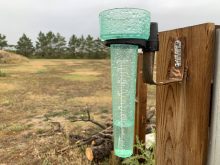Saskatchewan rural municipalities say they know when to declare a local emergency, and when to call one off.
RMs dealing with flood emergencies the last two years had to declare a new state of emergency every seven days, according to the province’s Emergency Planning Act.
One section of the act says a local emergency declaration expires every seven days unless renewed earlier, while another section allows local authorities to terminate the emergency when it no longer exists.
The RM of Benson, near Estevan, found itself in the position of having to call special meetings every week in order to extend its state of emergency.
Read Also

Manitoba bans wild boar possession
Manitoba has tightened the regulatory status of Eurasian wild boar in an effort to help fight back against invasive wild pigs.
Reeve Dave Hoffort told delegates to last week’s Saskatchewan Association of Rural Municipalities midterm convention in Regina that became costly and time-consuming when councillors were already dealing with the flood itself.
He said RMs should be allowed to declare an emergency only once.
Delegates agreed, passing a resolution that would see the section requiring renewal deleted.
They also passed a resolution asking the SARM board to lobby the province for programs to help municipalities with permanent flood and water control works.
Another resolution asked the board to lobby for a program to fund engineering and construction of new water control projects.
Linda Clavelle, councillor in the RM of Buckland, said her region is at a 65-year high for groundwater levels.
“This would be new channel clearing or drainage where none exist,” she told delegates.
Jim Hipkin, reeve from Lumsden, warned that the water has to go somewhere.
His RM in the Qu’Appelle Valley suffered extensive damage from upland drainage projects, he said.
The banks of the Qu’Appelle River are falling in, large trees have fallen and blocked water and the river itself is becoming shallower.
“The devastation that water did is phenomenal,” he said.
He and several others said that water control is critical to preventing future damage.
A related resolution called for the beaver control program to be extended for at least another year.
Delegates also want the crop insurance program changed so that the deductible is paid on net unseeded acres due to flooding, not the seeding intensity calculation used by Saskatchewan Crop Insurance Corp.
Other resolutions passed at the convention included one requesting SARM look at bylaw changes to allow its board members to seek nomination in federal and provincial elections without having to resign from SARM first.
The resolution was amended to say resignation would not be required unless the person was elected.
“Some of our best leaders are in this organization,” noted Herb Park of Rocanville.
Delegates want hiring municipal police officers made less onerous. Right now, an officer who has been retired for more than three years can’t be hired without taking an additional five months of training.
One delegate said RMs already pay a lot of money for RCMP service they don’t get and shouldn’t have to consider hiring more.
But another said being able to hire a municipal officer, perhaps in cooperation with neighbouring RMs, could help with bylaw enforcement.















